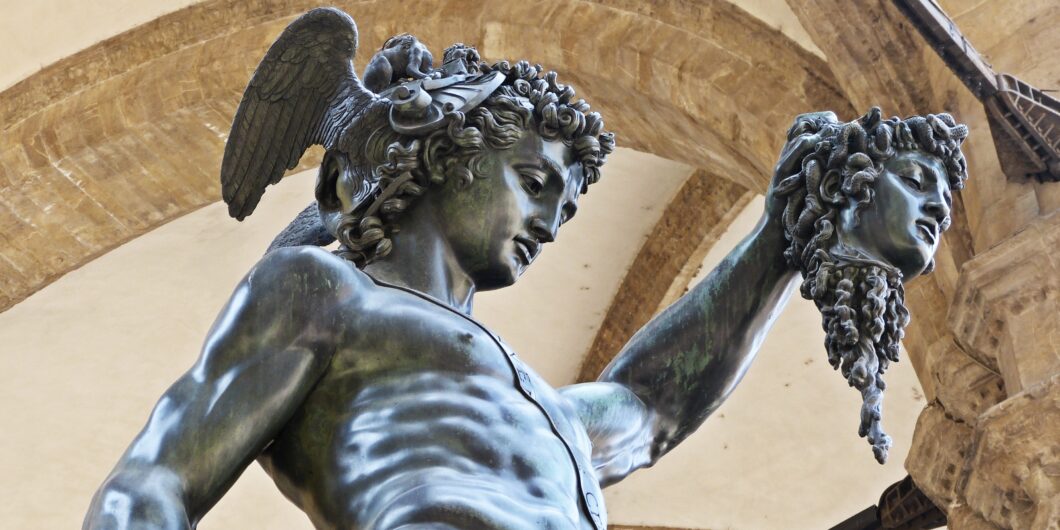Prevalent among political actors of all stripes today is a worrisome tendency to dismiss the Constitution’s constraints when those constraints run counter to a desired outcome.
The Militant Machiavelli
Like Nietzsche, Machiavelli is a cult philosopher. He has an aura (Machiavellian!) and a signature, what Pierre Manent dubs “a belief in the fecundity of evil.” As Machiavelli states in Discourses on Livy, people “always have to use the malignity of their spirit whenever they have a free occasion for it.”
Christopher Lynch’s Machiavelli on War is a highly detailed and complimentary reading of Machiavelli’s works which reveals that his reputed core ideas—the fecundity of evil and rejection of mercenaries—involve subtleties. Not all is as it seems. For anyone wanting an immersive experience in the life, times, and thoughts of Machiavelli, Lynch’s book is your first stop.
Machiavelli—one-time minister of war for the Renaissance city-state of Florence—contends that polities are born and die in wars. War bookends politics, so leadership must be ready to hold back oppression by force. For Lynch, to understand the role of war in Machiavelli is to appreciate his thought as a whole.
Time to Get Real
Animating Machiavelli’s political thinking is the belief that where “there are men [yet] there are no soldiers, it arises through a defect of the prince.” It is widely reported that the US military has a recruitment crisis. Fitness requirements have been lowered and recruitment videos focused on diversity have raised eyebrows globally. Despite the ham-fisted adverts, there is hope for the American military yet. Machiavelli’s “truest truth” is that no matter the material with which you must work, building combat power is possible because humans are malleable. The task of political philosophy is to identify the right incentives. As Lynch explains, for Machiavelli, those incentives turn out to be mercenary.
Carl von Clausewitz says that war is the simplest, yet hardest, of things. Machiavelli agrees. His original contribution, believes Lynch, was to show that war, and its connections to politics and the nature of things, is “infinitely more complex, comprehensive, and fundamental than previously imagined.” Understanding and preparing for war, for example, includes things as seemingly abstract as the relationship between ancient Greek philosophy and Christianity. Greek philosophy and Christianity, contends Machiavelli, both deprecate the honour of this world: favouring the contemplative and humble, they leave the world in the hands of criminals. The military mind must understand the harm of these systems of thought, that they “think more of enduring their beatings than of avenging them.” Warfare’s intellectual demands mean that war is only to be entrusted to those with capacious minds.
Greek and Christian philosophers, believes Machiavelli, will get you and yours killed, or worse, enslaved. He considered a fundamental rethink necessary in Western ideas because though the ancients knew “those overcome in war suffered every last misery,” they still wrote treatises on imaginary cities of light and reason. Pondering the realities of slavery and death, “prudence … takes much power away from heaven,” Machiavelli declares.
In the dedicatory letter of The Prince, Machiavelli declares that the new knowledge to be imparted stems “from long experiences with modern things and a continuous reading of ancient ones.” Historian of “the things of war,” he believes an adequate response to the realities of “the bellicose basis of politics itself” is hamstrung by the fact that people are oftentimes good and kind-hearted. This will not do: the political task is to compel wickedness. People are repeatedly attracted to “an imagined world” of goodness but such idle thinking must be demolished. People are malleable, so they can be trained in fury. Machiavelli considers that the utterly wicked is in fact a rare bird, but a republic that wants to survive had best be ready for the moment that rare bird lands: only a people primed with a greater quanta of wickedness can beat back a truly malevolent enemy. For Machiavelli, human evil is strategic, not a mainspring of our nature.
The political task is then “fury mixed with genuine virtue born of order.” The question is, what is virtuous order?
The Logic of Motivation
Describing events at the start of the sixteenth century, Machiavelli’s poems Decennials took shape when he was Florence’s minister of war. During his administration, he sought to lessen Florence’s reliance on mercenaries by creating a militia. In Machiavelli’s time, being a secretary of war was a “hands-on” job. In Florence, it was typical for the general to be a hired foreign professional with a Florentine commissioner beside him, even amidst battle itself. The idea was to keep the civilian oversight intimate with the whole campaign.
Machiavelli’s strategic goal was to deliver a long-standing hope: to conquer Pisa, so Florence would have an avenue to the sea. The challenge was to come by reliable forces, who would not, in von Clausewitz’s phrase, merely engage in an “observation war.”
There is no genuine aristocracy, Machiavelli warns. Leadership is always (or wannabe) oligarchs and tribunes, “tyrants in sheep’s clothing.”
Florentine tradition used local farmers as sappers to ruin enemy crops, so Machiavelli extended the militia far beyond that. He scoured Florence’s territories for males between 15 to 40 years of age and had them trained on the Swiss infantry model of massed pikes. Like so many immersed in war—Nelson, Bonaparte, von Clausewitz, Tolkien, and David Jones—Machiavelli was struck by the aesthetics: “As to the infantry, the companies are most beautiful.” Officers were rotated and never served in a militia unit drawn from their own region. This was to block partisanship, and for the same reason, the captain-general could not be hired from lands within 40 miles of Florence.
This approach was not completely original—other principalities had something similar. Machiavelli’s innovation was to be clear-eyed about motivation, the rewards and punishment for martial endeavour, or lack thereof. It is this aspect of his thinking that forces us to dial back his reputed revulsion at mercenaries.
Machiavelli did not subscribe to a high-minded Platonic ideal of the citizen soldier. “Given Machiavelli’s supposed hatred of mercenaries, it perhaps comes as a surprise to discover that property or individual profit turns out to be ‘no less a ground’ for rendering soldiers obstinate than their desire for self-preservation.” So convinced of this was Machiavelli that he prohibited soldiers’ pay from being sent home. Better they fight with their pockets full of gold and silver, he thought, knowing that if they lost their battles, then they and theirs lost everything. Machiavelli would have loved the later innovation of the prize courts where sailors got extra pay for rushing and taking over enemy ships. Lord Nelson was famously attentive to his sailors getting their prize money. In Art of War, Machiavelli observes that soldiers with trophies love to display them for friends and family. Clausewitz concurs—trophy seeking, he posits, is a deep-seated cause of military ardour.
Prudence required that Machiavelli’s reliance on a self-interested militia be modified after the disastrous 1509 Battle of Prato. Florence went on to adopt a hybrid model, with the militia in support of mercenary units. Furthermore, Machiavelli diluted his own mantra “arms of one’s own” to favour coalition warfare. He advocated, says Lynch, “a flexible alliance system that expands within limits and more reasonably manages passions by replacing the goal of unlimited conquest with that of mercenary profit.” Lynch relays the argument of the Discourses on Livy that the best policy is “a league of equal or ostensibly equal republics” wherein the member states calibrate risks and rewards and “hire themselves out to fight the wars within the league’s limited but glorious empire.” Obviously, here, Machiavelli pragmatically stretches the plain meaning of glory.
Machiavelli broke with the Western tradition, Lynch contends, because ideals of contemplation and humility “diverted mankind from the necessities and possibilities of human life.” Political cohesion is not served by expecting “harmony among domestic parties dedicated to the common good,” but rather by “standing together against outside forces.”
Henceforth, politics will take its coordinates not from universal principles, like a Platonic Eidos or the divine Verbum, but the particulars of war. For Machiavelli, the “most excellent human beings justified their lives with reference to pressing necessity rather than to a higher calling, law, or good.” Leadership needs most of all “to cultivate a certain type of thoughtfulness about particular situations,” and Machiavelli cautions against military doctrine. Lynch explains: “To have arms of one’s own is to think for oneself at each and every moment. To do anything else is to rely on others’ thoughts, which in effect is to rely on chance.” For example, sometimes “Machiavelli counsels that the only secure way to rule a defeated republic is to wipe it out almost completely, since republics never forget the name of liberty and are therefore sure to remain a future threat.” However, other times he counsels the very opposite: a high-minded treatment of enemies brings dividends. There are options, so leadership must not be doctrinaire but trust to its own prudential counsels.
This is not to say there are no political constants. Humans may be variable creatures, but interest is invariant. Polities need to understand that they are “exposed to the predations of whoever reads these necessities better than they.” Thus, Machiavelli recommends always staying close to “unavoidable human motivations.” Having pulled human thoughts away from heaven, and fixed them on money, Machiavelli would have us focus also on the most elemental, our possible disintegration. Best that people recall, says Machiavelli, that politics is ultimately rudimentary, it is about the impact of chance and necessity on each of us as a “composition and decomposition of mixed bodies.” Making us mindful that we are ever liable to disintegration, persons better appreciate “their vulnerability to chance and their consequent dependence on order or government.”
There is no genuine aristocracy, Machiavelli warns. Leadership is always (or wannabe) oligarchs and tribunes, “tyrants in sheep’s clothing.” There is nothing to lament in holding before all the spectre of their personal fragmentation, reminding them where their interest lies, “simply because that is how men are.” Like peoples, rulers need to grasp that their security resides in the friend/enemy distinction and that the best policy is “standing together against outside forces.” Part of what thinking in terms of particularities means is “circling the wagons” and being flinty towards others. Interest and partiality are the prudent political way forward, not generous openness.
The Modern Machiavelli
Machiavelli on War is physically beautiful. I doubt there is another university press putting out higher quality books than Cornell, if this example is representative. The book sleeve is a Renaissance battle scene, rich in colour and texture. Remove the sleeve and the binding is an attractive colourway, with an old-school marbling that is a throwback to an earlier age of bookbinding. That said, the pages are not sewn but glued, and that probably explains how the book comes at a decent price point of $40 for a hardback. Hopefully, already demonstrated, is that the book’s content matches the quality of its packaging.
I must state again that this is a detailed reading of Machiavelli’s texts, and some readers might wish for a wider discussion of political and military themes. Machiavelli’s goal, says Lynch, was “to lay bare the essential character of the relation between outside and inside things in the modern world.” Yet, book finished, I wonder in what sense we can say that Machiavelli is modern.
Lynch argues that “Machiavelli emerges as the captain-founder of the modern secular view of human life.” Machiavelli would approve of contemporary liberalism’s insistence that public reasons be based on science and materialism but he also comes across as anti-modern. Not for Machiavelli is the Enlightenment hope of perpetual peace. Adam Smith argues that global trade will advance through the division of labour, a phenomenon growing the wealth of nations ultimately founded upon the proclivity of humans to persuasive speech. By contrast, Lynch presents Machiavelli’s view that “the language of war suffuses our speech about persuasion.” Machiavelli seems to emerge, at best, as a counter-Enlightenment figure avant la lettre.
Another reason to regard Machiavelli as a counter-Enlightenment or postmodern thinker more than a modern is that, as Lynch explains, Machiavelli “seeks to cultivate a presumption of guilt within an atmosphere of suspicion.” Lynch comments that Machiavelli is the “founder of conspiracy theory as a fundamental orientation to the moral and political world.” A proponent of manipulation, Machiavelli casts reason as something like “force and fraud endemic to political rule and especially its founding moments.”
“On the level of actual physical warfare, he sought to prepare an army able to beat any other European army of his day, but also to provide guidance for military commanders of any time and place, including even our own.” Here’s where I feel we need a bit more from Lynch. It is noticeable that these counter-Enlightenment themes are absent from Clausewitz’s On War. That text is, of course, a high-Enlightenment product, but this raises the issue of what modernity is, and what we moderns expect from leadership. Rather than manipulation, I think we still expect truth-telling from leaders. What irks and erodes political legitimacy is the sense that our leadership just cannot stop lying to us. We do not valorize their conniving spirit but just want to get rid of them. Social and alternative media indulge conspiracy theories, but they also routinely show that government narratives are so much hokum. Without more from Lynch, I am not convinced Machiavelli captures the spirit of our age.
Machiavelli thought it near-impossible “for a good commander to also be thought a good person.” It is noteworthy, however, that it is one of the nuggets in The US Army/Marine Corps Counterinsurgency Field Manual—i.e., US military doctrine—that “lose moral legitimacy, lose the war.” No doubt Machiavelli would just roll his eyes at this piece of military guff, but perhaps, also grudgingly admire the staying power of his nemesis, our appetite for “an imagined world.” However, the point is that we moderns do expect our legions to be moral. Machiavelli and the slaughter of war notwithstanding, the West’s ancestral humanism has long expected that legions pursue their trophies morally.



